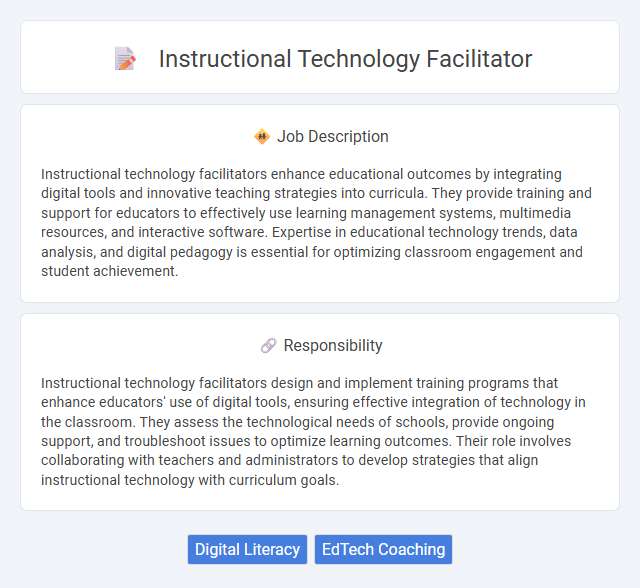
Instructional technology facilitators enhance educational outcomes by integrating digital tools and innovative teaching strategies into curricula. They provide training and support for educators to effectively use learning management systems, multimedia resources, and interactive software. Expertise in educational technology trends, data analysis, and digital pedagogy is essential for optimizing classroom engagement and student achievement.
Individuals with strong communication skills and a passion for integrating technology in education are likely suitable for the role of an Instructional Technology Facilitator. Those who enjoy collaborating with teachers and troubleshooting technical issues may find the position fulfilling. However, people who prefer solitary work or lack adaptability to rapidly changing technology might face challenges in this job.
Qualification
Instructional technology facilitators typically require a bachelor's degree in education, educational technology, or a related field, with many employers preferring a master's degree. Strong proficiency in integrating technology into curriculum design and a deep understanding of digital tools such as LMS platforms, interactive software, and multimedia resources are essential. Effective communication skills and experience in professional development or training educators on technology use further qualify candidates for this role.
Responsibility
Instructional technology facilitators design and implement training programs that enhance educators' use of digital tools, ensuring effective integration of technology in the classroom. They assess the technological needs of schools, provide ongoing support, and troubleshoot issues to optimize learning outcomes. Their role involves collaborating with teachers and administrators to develop strategies that align instructional technology with curriculum goals.
Benefit
Instructional technology facilitators likely improve learning outcomes by integrating advanced digital tools and enhancing educator proficiency. Their expertise probably streamlines instructional processes, leading to increased efficiency in curriculum delivery. Schools may experience a boost in student engagement and achievement through their support and training initiatives.
Challenge
Instructional technology facilitators likely face the challenge of staying current with rapidly evolving digital tools and educational software. They probably need to adapt training methods to diverse educator skill levels while managing resistance to new technologies. Balancing technical support with instructional strategy development may also present ongoing difficulties.
Career Advancement
Instructional technology facilitators enhance educational outcomes by integrating technology into teaching practices and training educators on digital tools. Career advancement opportunities include roles such as technology integration specialist, curriculum developer, or educational technology director, often requiring advanced certifications or degrees. Mastery of emerging technologies and strong leadership skills accelerate progression to administrative or policy-making positions within educational institutions.
Key Terms
Digital Literacy
An Instructional Technology Facilitator specializes in enhancing digital literacy by integrating innovative educational technologies into classroom settings. They provide targeted training and support to educators and students, ensuring effective use of digital tools to improve learning outcomes. This role involves assessing technology needs, implementing digital curriculum resources, and promoting safe, responsible use of technology in educational environments.
EdTech Coaching
Instructional technology facilitators specialize in EdTech coaching to enhance teachers' integration of digital tools and innovative learning platforms, improving classroom engagement and student outcomes. They provide personalized training sessions, troubleshoot technical issues, and collaborate with educators to develop effective technology-driven lesson plans. Mastery in educational software, data analytics, and blended learning methodologies is crucial for maximizing instructional impact.
 kuljobs.com
kuljobs.com